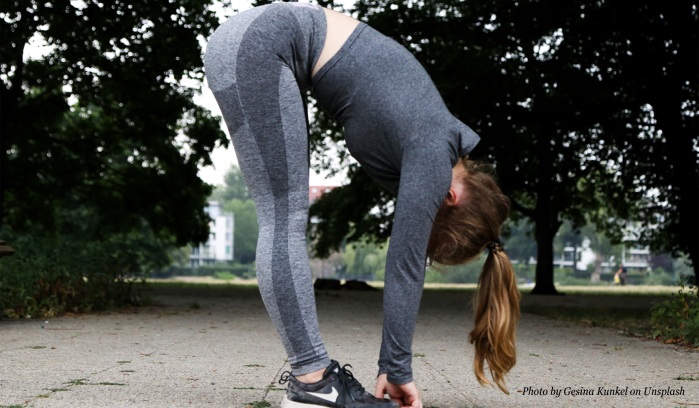Don’t feel like reading? Listen to the audio version here:

This past week has been frustrating for me. I’ve been experiencing a lot of neck- and back pains, which has resulted in headaches, even migraines. Problem is, the migraine medication might take away the headache, but not the muscle pains. It’s been interfering with my sleep, and I’ve woken up almost every night because of the pain and stiffness in my body. I’ve had to get out of bed once or twice, go into the living room, and do some stretching and exercises. Even after that I’d still get just a few hours of restlest sleep. It’s been hurting during the day, but apparently the headaches only come out at night. I could make some sort of vampire joke, but I got nothin’.
I’ve been trying to not sit in front of my computer too much the past few days, and moving my body more, hoping it might help. So far, not really. My next massage appointment is on Tuesday – veeeery much looking forward to that.
Now, I’ve learned plenty of exercises over the years that I could do daily to ease the pain and keep it in check. I’ve just never managed to make it a part of my daily routine. However, I managed to finally roll out my yoga mat the other night, stretched, and did some exercises. And I was finally able to sleep through the night, which was a big triumph.
I’m fully aware that if I just spent ten minutes every day, or just before bed, lying or standing on that mat doing my exercises, it would have a very positive effect on my body. There’s a high chance that it would reduce the number of migraines as well as days and days of muscle pains and restless sleep. Be that as it may, actually doing it is a lot harder than it sounds. I’m sure most people can relate.
I also have some specific conditions that need to be in place before I can pull out my yoga mat and get down to business. For instance, the floor has to be clean – or at least vacuumed – for me to put the mat on the floor and lie down. Seeing dust all around me at eye level makes me extremely uncomfortable, and I get totally grossed out. So if the floor is not clean enough, I just can’t do it. I’d have to first vacuum, and that would make the process longer and more bothersome, and so I just can’t get myself to do it.
We all know that creating a new habit is very difficult, especially if it has to do with exercise, in my experience. I’ve never been good at or even particularly liked sports, never been super physically active, never joined any sports club or anything like that. I’d sit and draw, or write, or read, or play video games, stuff like that. Indoor sitting-activities. PE was always my least favorite subject. When I was around 15 (I think), however, my parents got my sister and me gym memberships, and I had periods of time when I went regularly, like 3-4 times a week. I really liked it. But after I moved out, I couldn’t afford paying for a membership, so I had to quit. I’ve tried joining again several times over the years, but my finances always seemed to change so that I had to cancel my membership because I just couldn’t pay for it.
I would love to start going to the gym again. Hopefully I’ll be able to afford it again in the nearest future – doesn’t look like it, though. Hm.
Do any of you have some good advice on how to start a new yoga/stretching/exercising routine for someone with back- and neck pains? I need all the help I can get.
Hope you’ve had a good week and are enjoying your weekend.

